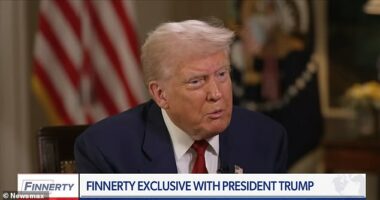“They’re exempt from the reciprocal tariffs but they’re included in the semiconductor tariffs, which are coming in probably a month or two,” Lutnick told ABC’s “This Week”.
Trump added to the confusion hours later, declaring on social media that there was no “exception” at all because the goods are “just moving to a different” bucket and will still face a 20 per cent tariff as part of his administration’s move to punish China for its role in fentanyl trafficking.
The Trump administration had said it would exclude electronics from broader so-called reciprocal tariffs, a move that could help keep the prices down for phones and other consumer products that aren’t usually made in the US.
China’s commerce ministry in a Sunday statement welcomed the change as a small step even as it called for the US to completely cancel the rest of its tariffs.

Sparing electronics was expected to benefit big tech companies like Apple and Samsung and chip makers like Nvidia, though the uncertainty of future tariffs may rein in an anticipated tech stock rally tonight.
US Customs and Border Protection said items like smartphones, laptops, hard drives, flat-panel monitors and some chips would qualify for the exemption. Machines used to make semiconductors are excluded too. That means they won’t be subject to most of the tariffs levied on China or the 10 per cent baseline tariffs elsewhere.
It was the latest tariff change by the Trump administration, which has made several U-turns in its massive plan to put tariffs in place on goods from most countries. White House officials sought to dismiss any suggestion of a reprieve as the weekend progressed.

On Air Force One Saturday night, President Donald Trump told reporters he would get into more specifics on exemptions on Monday. In his post Sunday on TruthSocial, he promised the White House was “taking a look at Semiconductors and the WHOLE ELECTRONICS SUPPLY CHAIN.”
Some had assumed the exemption filed night reflected the president’s realisation that his China tariffs are unlikely to shift more manufacturing of smartphones, computers and other gadgets to the US any time soon, if ever.
The administration has predicted that the trade war prod Apple to make iPhones in the US for the first time, but that was an unlikely scenario after Apple spent decades building up a finely calibrated supply chain in China.
It would take several years and cost billions of dollars to build new plants in the U.S., burdening Apple with economic forces that could triple the price of an iPhone and torpedo sales of its marquee product.
Neither Apple nor Samsung responded to requests for comment over the weekend. Nvidia declined to comment.






